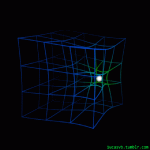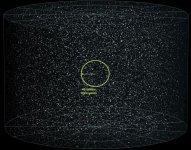There is a fantastic animation of space-time curvature embedded in Ethan’s article. Forget the rubber sheet version we are all familiar with which essentially depicts it in 2D, the animation shows it in 3D.
Reading the article now. Here's a quote which is pertinent to our previous discussion:
Let's see if the 3D animation of the curving of spacetime pops up below:
Newton was able to do something that no one else had been able to do: calculate, from any initial conditions that you could set up a physical system with, what that system will evolve into or would have evolved from at any moment in the past or future. This mathematical tool remains the foundation of almost all of modern physics.
Let's see if the 3D animation of the curving of spacetime pops up below:
Attachments
Anyone who believes in a deterministic Universe, as I don't,

must have been shocked by the weeks news!
The James Webb Space Telescope has taken a micro-meteoroid hit on the C3 panel:
https://www.bbc.co.uk/news/science-environment-61744257
Seems like there is a lot of junk flying about up there.
For sure, we live on the surface of a 4D manifold. But the rest is uncertain.
must have been shocked by the weeks news!
The James Webb Space Telescope has taken a micro-meteoroid hit on the C3 panel:
https://www.bbc.co.uk/news/science-environment-61744257
Seems like there is a lot of junk flying about up there.
For sure, we live on the surface of a 4D manifold. But the rest is uncertain.
I'm not even sure "expand " is the right term...
I'd like to return to the expansion of the universe, as it is often misunderstood.
It is a misconception that the universe is expanding outwards from a central location into some kind of 'outside emptyness'.
Initially, all points in space (or, more correctly, spacetime) were very, very close together.
Subsequently, all points in space have become more and more distant, not from some central point but from each other.
The matter that occupies space has been swept along with this inherent, fundamental expansion of space - except locally where gravity prevents it.
We can't see further away than the edge of the observable universe, but we can only suppose that there is 'more of the same' beyond - the universe is 'all that there is'.
Attachments
Last edited:
Initially, all points in space (or, more correctly, spacetime) were very, very close together.
and...
Subsequently, all points in space have become more and more distant, not from some central point but from each other.
Yo don't feel any hesitation, logic wise, to write these two sentences after each other?
:-D
//
and...
Subsequently, all points in space have become more and more distant, not from some central point but from each other.
Yo don't feel any hesitation, logic wise, to write these two sentences after each other?
:-D
//
Yo don't feel any hesitation, logic wise, to write these two sentences after each other?
Please explain the 'illogicality'.
Distance is not an absolute in spacetime.
The metric which defines distance is changing with time in such a way that the spatial dimensions appear to grow or stretch.
I thought you understood the raisin bread model!
Attachments
If first "it" is really really small - small means occupying a not big amount of space - lets call the space A. This means that "it" is not with-spread but rather, concentrated in one place. Like a ping-pong ball.
Now, if "it" inflates to a very big thing taking a considerable large space into account - lets call the space B - and "it" did indeed previously fit in a very small space (see above, A) - "it" actually has an origin in A (small) and time (before) but "it" is now enormously big, filling B later in time - "it" actually has expanded with an origin. Now the expansion might have been fast but not zero seconds - so during the expansion one could trace every aspect of how A turned into B and thus, there is a centre point of origin... A.
QED.
//
Now, if "it" inflates to a very big thing taking a considerable large space into account - lets call the space B - and "it" did indeed previously fit in a very small space (see above, A) - "it" actually has an origin in A (small) and time (before) but "it" is now enormously big, filling B later in time - "it" actually has expanded with an origin. Now the expansion might have been fast but not zero seconds - so during the expansion one could trace every aspect of how A turned into B and thus, there is a centre point of origin... A.
QED.
//
Why would acceleration stop?The question is why is this happening?
thus, there is a centre point of origin... A.
QED.
If our Universe started with a Big Bang and has been expanding ever since, there would have been a time in the very distant past when any two points were very close together and things were squashed together into a state of very high density.
This is not the same as saying the universe had a "centre point of origin".
We don't know how big the universe is. It may be infinitely big, in which case it will have been infinitely big at the time of the Big Bang! 😉
Ok distances, do increase. Everybody says so.
With what do you measure the distances ???? With an invariant no stretch ruler ?
With what do you measure the distances ???? With an invariant no stretch ruler ?
there is a centre point of origin
It is better to think of the Big Bang as the simultaneous appearance of space everywhere in the Universe.
The Universe has not expanded from any one spot since the Big Bang - rather, space itself has been stretching, and carrying matter with it
With what do you measure the distances ???? With an invariant no stretch ruler ?
There are several different ways of defining distance in cosmology, but the most common is comoving distance.
https://www.wikiwand.com/en/Comoving_and_proper_distances
To determine the distance of distant objects, astronomers generally measure luminosity of standard candles, or the redshift factor 'z' of distant galaxies, and then convert these measurements into distances based on some particular model of spacetime, such as the Lambda-CDM model.
EDIT: I've substituted a more approachable link on comoving and proper distances.
Last edited:
Here's an extract from above link:
Proper distance roughly corresponds to where a distant object would be at a specific moment of cosmic time, which can change over time due to the expansion of the Universe.
Comoving distance factors out the expansion of the universe, giving a distance that does not change in time due to the expansion of space.
Comoving distance and proper distance are defined to be equal at the present time.
At other times, the Universe's expansion results in the proper distance changing, while the comoving distance remains constant.
"Better"? ;-) There isn't anything simultaneous...It is better to think of the Big Bang as the simultaneous appearance of space everywhere in the Universe.
The Universe has not expanded from any one spot since the Big Bang - rather, space itself has been stretching, and carrying matter with it
Well, I'll bite...
- So the Cosmos is infinite in mass, energy and distance. It has existed forever and will exist forever. Human has had a history of underestimating the wastness of things and I suppose we are most bloody probably doing it again. What we call BB and what we think it involves is most probably wrong. One thing is probably correct and that is that there was a "major" event happening in "our part of the hoods" - so grand at the time that it now shadows anything beyond it - but it was still a "local" event. Poff. Maybe a Hyper-Nova. What we see we call the observable universe. The observable universe is all the matter and energy that was scattered in the "explosion", which had a centre like any other supernova and now everything is moving away from each other. OK. So clearly the question is wrongly formed. The matter and energy involved in the local "poff" / boom is being thrown into Cosmos of which we cant see anything of as it is either to far away or shadowed by the initial energy eruption heat/radiation, now "the afterburn" of the BBang. Cosmos is everything but we call that we can see, Universe. Universe is not "expanding" into Cosmos, its being thrown/shot/ejected/driven into Cosmos which has always been there and are the same as we see here in our little Universe.
I herby renounce my believe in the BC/BB idea ;-D
Long live the basic explosion, bang and trotyl - and why not TNT? 🙂
//
The question is why is this happening?
Why does anything happen in this crazy universe?

- Status
- Not open for further replies.
- Home
- Member Areas
- The Lounge
- What is the Universe expanding into..



